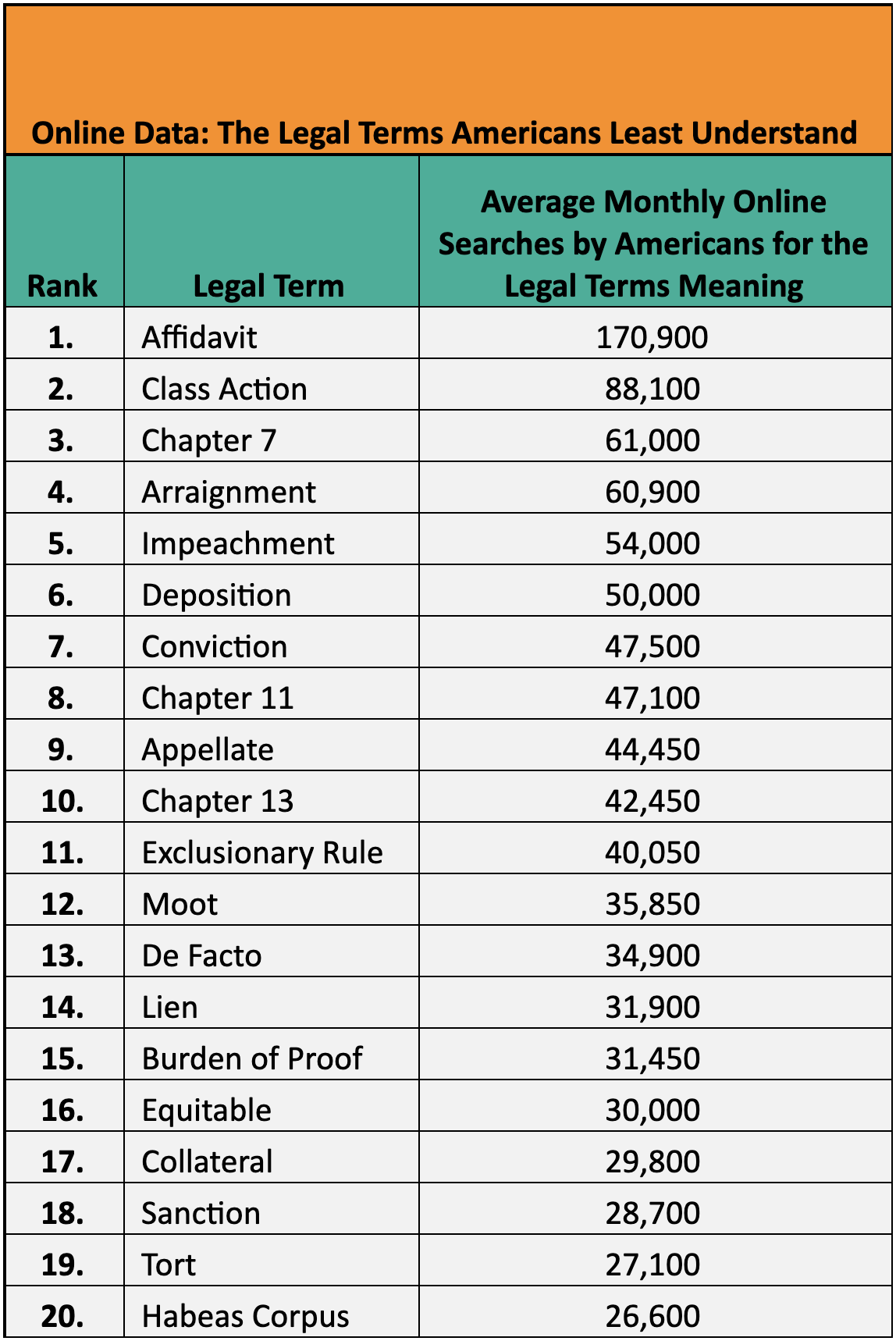Knowingly or unknowingly, we are all being exposed to a range of legal terminology on a daily basis. Whether it be the president at risk of impeachment or a business/entrepreneur having to file for chapter 11 bankruptcy, but do we have a strong grasp of the meaning of such common legal jargon?
The Research:

Interested in legal awareness, Upliftlegalfunding.com identified a seed list of 236 legal terms from United States courts and then utilised online analytics tool Ahrefs to establish the top 20 legal terms that Americans least understand.
The Findings from the Research:
Upliftlegalfunding.com found that ‘affidavit’ is the legal term that Americans are most unsure about, exemplified by an average 170,900 online searches per month from Americans trying to discover the legal term’s true meaning.
‘Class action’ is in second position, as there are an average 88,100 online searches a month from Americans wanting to understand what the legal term truly represents.
In third position is ‘chapter 7’, with an average 61,000 monthly online searches from Americans trying to educate themselves on what the legal term means.
‘Arraignment’ (60,900), ‘impeachment’ (54,000) and ‘deposition’ (50,000) are among the other legal terms that receive 50,000 or more online searches a month from Americans trying to determine their true context and use in the legal field, respectively ranking fourth, fifth and sixth.
Interestingly, other legal bankruptcy codes such as ‘chapter 11’ and ‘chapter 13’ feature in the top 20 least understood legal terms, with 47,100 online searches a month from Americans for the meaning of chapter 11 and 42,450 online searches a month from Americans for the meaning of chapter 13.
At the other end in 20th position is ‘habeas corpus’, with an average 26,600 online searches every month from those Americans seeking to gain more knowledge on the legal term.
The Definitions of the 20 Legal Terms:
- Affidavit – A written, or printed statement made under oath. It is typically provided alongside a witness statement to prove the truthfulness of a statement in court.
- Class Action – Is a lawsuit which is filed or defended by an individual acting on behalf of a group.
- Chapter 7 – Is a chapter of the bankruptcy code permitting the liquidation of assets to pay creditors.
- Arraignment – Is the formal reading of a criminal charging document to clearly inform the defendant in-person of the charges against them, thereafter, typically asking them to plead guilty or not guilty.
- Impeachment – The action of calling into question the validity of a witness’s testimony or a formal charge of misconduct pursued against a holder(s) of a public office position.
- Deposition – A verbal statement typically made before an officer authorised by law to administer an oath or oaths.
- Conviction – A formal declaration by the verdict of jury or decision by judge that a criminal defendant is guilty of a criminal offence.
- Chapter 11 – Is a chapter of the bankruptcy code permitting the reorganisation of a corporation or partnership to keep a business running and pay its creditors over time.
- Appellate – The process of handling applications for decisions to be reversed.
- Chapter 13 – Is a chapter of the bankruptcy code permitting a debtor to keep property and instead use their disposable income to pay their debts typically over a three-to-five-year period.
- Exclusionary Rule – A law that prohibits the use of illegally obtained evidence in a criminal trial.
- Moot – Not subject to court ruling because the controversy has not actually arisen, or a mock judicial proceeding set up to conduct hypothetical cases as an academic exercise.
- De Facto – Something that exists but not necessarily by legal right.
- Lien – A defined right to keep possession of property belonging to another person until a debt owed by that person is discharged.
- Burden of Proof – The obligation to provide disputed facts.
- Equitable – The difference between legal and equitable rights.
- Collateral – Property that is pleaded as security for the satisfaction and repayment of a debt.
- Sanction – Types of enforcement such a penalty used to enforce/bring about compliance with the law or with set rules and regulation.
- Tort – A civil but not criminal wrong.
- Habeas corpus – A writ requiring a person under arrest to be brought before a judge or into court.


